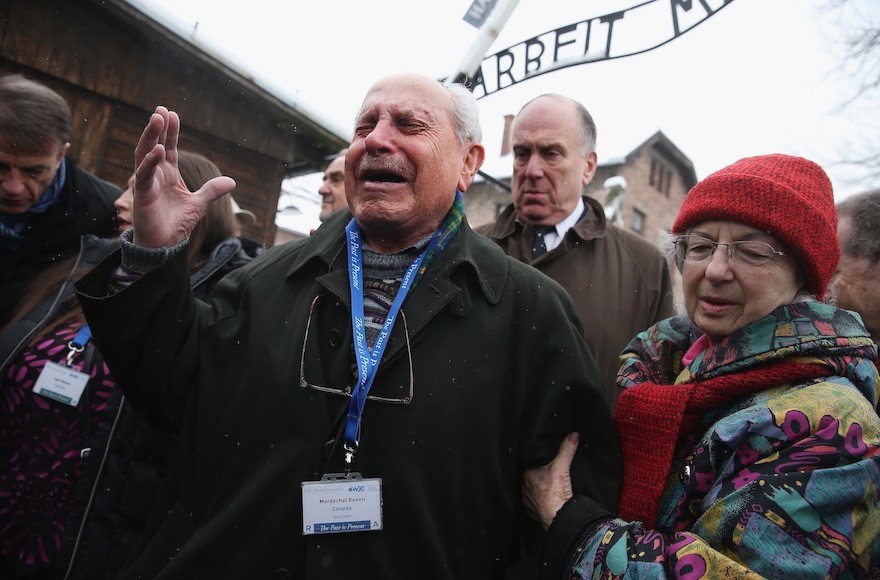Israel expands survivor benefits, but most live in poverty
Published January 27, 2016

Mordechai Ronen, who was a prisoner at the Auschwitz concentration camp when he was an 11-year-old child and lost his mother, father and sisters there, breaking into tears as he walks through the camp, which is now a museum in Oswiecim, Poland, Jan. 26, 2015. (Sean Gallup/Getty Images)
According to a new Israeli law, some North African Jews are Holocaust survivors too.
ADVERTISEMENT
In 1940, Vichy France passed a series of draconian anti-Semitic laws, which also applied to the Jews living in the regime-controlled North African colonies. The Jews were stripped of their citizenship and prohibited from holding public office, owning businesses, working in finance and studying in public schools.
In December, seven decades after the Holocaust, Israel finally recognized French North African Jews as Holocaust survivors. The passage of the law was the latest step in a gradual expansion of whom Israel considers a survivor — and entitled to associated benefits. Yet, two-thirds of Israeli survivors remain “distressed.”
In Israel’s founding years, talk of the Holocaust was shunned, and survivors were at times derided as passive and weak. Survivor benefits were offered to a select group in the state’s first decades. They went only to Jews who had been in ghettos or concentration camps — and who had immigrated before 1953, after a European mechanism for survivor compensation took effect.
Israel has since offered more and more Jews who lived through the Holocaust survivor benefits. Post-1953 survivor immigrants receive compensation, as do North African survivors and those who escaped without suffering in ghettos or camps.
READ: On Holocaust Remembrance Day, former prisoners mark liberation at Auschwitz
Assisting survivors is now a political talking point. Former Finance Minister Yair Lapid, whose father Tommy survived the Holocaust, prioritized increasing survivor benefits — an achievement he touted repeatedly during last year’s election campaign. During his tenure, Lapid increased the budget for survivor assistance by $25 million.
ADVERTISEMENT
His successor, Moshe Kachlon, has followed in his footsteps, calling the expansion of benefits to some 2,000 North African survivors “the righting of a historical wrong.”
Benefits even go to Jews who lived in Iraq during the Holocaust, though Axis powers did not control the country during the war. Under a pro-Nazi government in 1941, a Baghdad pogrom called the Farhud killed hundreds of Jews.
The expansions come as Israel’s survivor population is dwindling. Some 40 survivors die every day in Israel, and 14,200 are expected to die this year.
Even as Israel has broadened its qualifications for survivor benefits, a large portion of Israel’s nearly 200,000 survivors live in poverty. A 2015 survey by the Foundation for the Benefit of Holocaust Victims in Israel found that one quarter of Israeli survivors can’t afford medicine, while 30 percent sometimes go without food. Two-thirds say they are “distressed” by their financial situation.
“There are still gaps between the response and what’s needed,” Roni Klinsky, the foundation’s CEO, told JTA in 2014. In the past, “people got less help and weren’t organized enough to get assistance. The state always has troubles. There are wars and new immigrants. But the survivor issue wasn’t a high priority.”
This entry passed through the Full-Text RSS service – if this is your content and you’re reading it on someone else’s site, please read the FAQ at fivefilters.org/content-only/faq.php#publishers.















